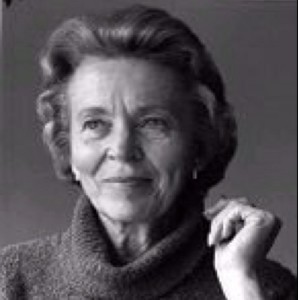 One of the great women of faith of our time passed through the Gates of Splendor early Monday morning. Elisabeth Elliot influenced me by her example of faith, forgiveness, perseverance, and courage. She had an unusual ability to cut through the murky fog to speak truth into the heart of a matter. As a single missionary, I learned valuable lessons about loneliness and suffering from both her life and that of her role model, Amy Carmichael, about whom she wrote.
One of the great women of faith of our time passed through the Gates of Splendor early Monday morning. Elisabeth Elliot influenced me by her example of faith, forgiveness, perseverance, and courage. She had an unusual ability to cut through the murky fog to speak truth into the heart of a matter. As a single missionary, I learned valuable lessons about loneliness and suffering from both her life and that of her role model, Amy Carmichael, about whom she wrote.
A great privilege of my life was when Elisabeth and her husband Lars visited our cozy Cru staff conferences in New England. While nuggets of God’s wisdom dripped from Elisabeth’s well-chosen words, spoken in her to-the-point Yankee style, Lars made almost as big an impression on me. He quietly and good-naturedly sat in the sidelines, handling all the business matters. He helped his wife shine with Jesus’s light as she spoke about another husband. Not many men are secure enough to do that. He also tenderly cared for her daily needs during the twilight years of her dementia.
Here are some of the pearls I gathered from Elisabeth:
“Of one thing I am perfectly sure: God’s story never ends with ashes.”
“There is nothing worth living for, unless it is worth dying for.”
“Do the next thing.”
When two alternatives seem equally right, “Choose the harder of the two ways.”
Quoting her husband Jim’s journal: “He is no fool who gives what he cannot keep to gain that which he cannot lose.”
“Leave it all in the Hands that were wounded for you.”
“A grain of wheat remains a solitary grain unless it falls to the ground and dies; but if it dies, it bears a rich harvest.”
“The fact that I am a woman does not make me a different kind of Christian, but the fact that I am a Christian makes me a different kind of woman.”
“Today is mine. Tomorrow is none of my business. If I peer anxiously into the fog of the future, I will strain my spiritual eyes so that I will not see clearly what is required of me now.”
“We must quit bending the Word to suit our situation. It is we who must be bent to that Word, our necks that must bow under the yoke.”
“Faith does not eliminate questions. But faith knows where to take them.”
“God has promised to supply all our needs. What we don’t have now, we don’t need now.”
“Don’t dig up in doubt what you have planted in faith.”
This morning, I found a brief autobiography in her wonderfully understated manner.
My parents were missionaries in Belgium where I was born. When I was a few months old, we came to the U.S. and lived in Germantown, not far from Philadelphia, where my father became an editor of the Sunday School Times. . . .
Our family continued to live in Philadelphia and then in New Jersey until I left home to attend Wheaton College. By that time, the family had increased to four brothers and one sister. My studies in classical Greek would one day enable me to work in the area of unwritten languages to develop a form of writing.
A year after I went to Ecuador, Jim Elliot, whom I had met at Wheaton, also entered tribal areas with the Quichua Indians. In nineteen fifty three we were married in the city of Quito and continued our work together. Jim had always hoped to have the opportunity to enter the territory of an unreached tribe. The Aucas were in that category—a fierce group whom no one had succeeded in meeting without being killed. After the discovery of their whereabouts, Jim and four other missionaries entered Auca territory. After a friendly contact with three of the tribe, they were speared to death.
Our daughter Valerie was 10 months old when Jim was killed. I continued working with the Quichua Indians when, through a remarkable providence, I met two Auca women who lived with me for one year. They were the key to my going in to live with the tribe that had killed the five missionaries. I remained there for two years.
After having worked for two years with the Aucas, I returned to the Quichua work and remained there until 1963 when Valerie and I returned to the U.S.
Since then, my life has been one of writing and speaking. It also included, in 1969, a marriage to Addison Leitch, professor of theology at Gordon Conwell Seminary in Massachusetts. He died in 1973. After his death I had two lodgers in my home. One of them married my daughter, the other one, Lars Gren, married me. Since then we have worked together.
Well done, good and faithful servant! You will be missed.